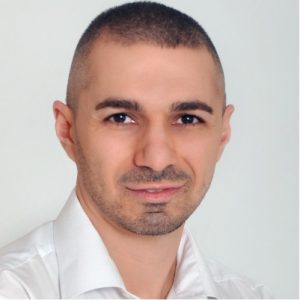GCF-AGA Grant Recipient El-Zaatari Charts Progress on Three Research Efforts
 Ever since Mohamad El-Zaatari, Ph.D., research assistant professor at the University of Michigan, received the first GCF-American Gastroenterology Association grant in 2014, he has made great progress on the three research projects he was able to jumpstart with the $270,000 award.
Ever since Mohamad El-Zaatari, Ph.D., research assistant professor at the University of Michigan, received the first GCF-American Gastroenterology Association grant in 2014, he has made great progress on the three research projects he was able to jumpstart with the $270,000 award.
The grant was an important stepping stone to a half-million-dollar award from the U.S. Department of Defense that El-Zaatari received in 2017. Building on research he started with the GCF-AGA funding, El-Zaatari is now studying how precancerous lesions develop in the stomach—and how they can be treated.
“Many gastric cancers start off with immune cells attacking our own ‘self’ cells” El-Zaatari explains. This “autoimmune” process by B cells had not been previously considered to play a part in gastric cancer, and the exact role of those cells in this context is still unknown.
El-Zaatari performed studies in mice that lack B cells and was able to identify markers of precancerous changes in the stomach, he says. “Now we are investigating this further, so we can understand the exact role of B cells, because they clearly play a role.”
For example, El-Zaatari is investigating the role of H. pylori, a bacterium that’s been linked with gastric cancer risk and that’s known to activate B cells. El-Zaatari has hypothesized that the FDA-approved B-cell inhibitor Rituxan (rituximab), currently used to treat lymphoma, might reduce the risk of refractory precancerous stomach lesions, which fail to reverse in response to eradicating H. pylori. With further research, he hopes to determine whether the drug could be used for that purpose.
El-Zaatari is also working with CD8 T cells—immune cells that infiltrate the inflamed stomach and seem to fuel the formation of precancerous lesions. He has found a way to control the extent of their infiltration and believes these cells could be engineered to carry cancer-killing therapeutics into the stomach—in essence converting a harmful process into something that helps patients.
“Since we can now control the CD8 T cells’ ability to infiltrate the gastric mucosa, we can now aim to target them against cancer cells in the inflammatory environment, and study the possibility of combining the two mechanisms together” El-Zaatari says.
El-Zaatari has also been investigating another population of immune cells called myeloid-derived suppressor cells (MDSCs). He has studied how (MDSCs) communicate with the epithelial layer in the stomach to regulate precancerous lesions. He is currently completing a paper that he hopes to submit for publication soon.
None of this work would have been possible without the GCF-AGA grant, now called the AGA-GCF Ben Feinstein Memorial Research Award in Gastric Cancer, El-Zaatari says. “When I got the grant five years ago, I had been studying gastric cancer for 12 years and I didn’t have the funding to pursue pathways that I thought were important,” he says. “It gave me funding at that critical period, and now I’m developing projects, some of which I feel in the near future could be pursued for commercialization. Now I can innovate in the field of gastric cancer and put all my effort into helping people with the disease.”
Thanks to supporters of the Gastric Cancer Foundation, we will continue to fund talented young investigators who are devoting their careers to finding new cures for this challenging disease.

